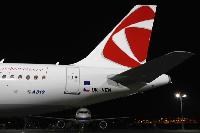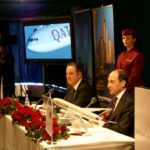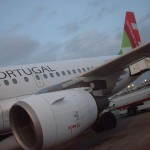Czech Airlines has received another new Airbus A319. The aircraft arrived last night, from the Airbus aircraft assembly centre in Hamburg, Germany. Upon arrival, the new plane headed for a hangar, to undergo a standard check-up prior to deployment. Passengers should encounter it for the first time on the morning flight from Prague to Brussels, on Thursday 20 March.
It usually takes four days to accept a new aircraft from a manufacturer. The process involves Czech Airlines employees and representatives of the Czech Civil Aviation Authority. “First, a static inspection takes place, tests of the aircraft with the engines going, and an engine test. On the second day, the aircraft goes for a test flight,” explained Zdeněk Tyrner, Head of Aircraft Technology for the Airbus A320 family. After the test flight, the technical acceptance of the aircraft is completed, and on the fourth day the official hand over of documentation takes place, the money is transferred, documentation signed, and ownership of the aircraft transferred. The representatives of the Civil Aviation Authority then issue certificates for the aircraft and the temporary German matriculation is replaced with a new Czech symbol. The matriculation of the aircraft received yesterday is OK-NEN.
Czech Airlines deploys its most modern aircraft on its priority routes, such as from Prague to Brussels, Barcelona, Madrid, Amsterdam, Frankfurt, Düsseldorf, and Milan, as well as to Odessa, Sofia, Riga, and Samara. The aircraft will also fly to the new destinations that Czech Airlines is opening in 2008, such as Tbilisi, Rostov-on-Don, and Damascus.
The new aircraft offers seats for 135 passengers, arranged in two classes – Business and Economy. Compared to classic-generation aircraft, its cabin is roomier and wider, boasting larger overhead storage compartments. On board, a modern in-flight entertainment system is available, which will make it possible to provide such services as current information about the flight. The new generation aircraft are more economical to run and are environmentally friendlier than the classic-generation aircraft.






